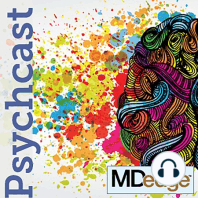7 min listen
Prescribing clozapine for patients with refractory schizophrenia
FromPsychcast
ratings:
Length:
31 minutes
Released:
Jul 10, 2019
Format:
Podcast episode
Description
Show Notes By Jacqueline Posada, MD, 4th-year resident in the department of psychiatry & behavioral sciences at George Washington University, Washington. In this episode, Lorenzo Norris, MD, host of the MDedge Psychcast, interviews Jonathan M. Meyer, MD, about prescribing clozapine and understanding barriers of use. Dr. Meyer is clinical professor of psychiatry, University of California, San Diego, and a psychopharmacology consultant with the California Department of State Hospitals. Overview of clozapine Clozapine is an effective medication for treatment-resistant schizophrenia and lethality/suicide. Clozapine is underused by clinicians for many reasons. Clinicians have less comfort with prescribing clozapine. Too few trainees are exposed during residency to prescribing clozapine. Using clozapine during training provides the knowledge and comfort necessary to prescribe it once out in practice. Fear of prescribing clozapine outweighs the benefits to patients who need it. Other barriers include monitoring burdens in confluence with systems issues. Indications for use Treatment-resistant schizophrenia is defined as an inadequate response to two antipsychotic trials, and treatment-resistant schizophrenia occurs in about 30% of patients with schizophrenia. People with treatment-resistant schizophrenia have a 5% chance of responding to other antipsychotic medications, while the response rate to clozapine is about 40%. In light of those statistics, getting patients with schizophrenia on clozapine should be a priority. Everyone benefits when a patient with treatment-resistant schizophrenia is started on clozapine. Clozapine treatment leads to decreased symptoms and suffering, improved quality of life, decreased suicidality and aggression, and lower hospitalization rates, which in turn, lead to decreased health care costs. Barriers to using clozapine Education is key to empowering physicians to start prescribing clozapine and overcoming the initial resistance to prescribing. SMI Adviser is a website sponsored by the American Psychiatric Association (APA) and the Substance Abuse and Mental Health Services Administration (SAMHSA) that provides access to education, data, and consultations for clinicians who treat serious mental illness. SAMHSA also has sponsored “centers of excellence” in New York state and the Netherlands that provide consultation and on-demand answers to questions about prescribing. The Clozapine Handbook, written by Dr. Meyer and Stephen M. Stahl, MD, PhD, is another centralized resource for prescribers. Dr. Meyer and Dr. Stahl wrote the handbook to educate and encourage clinicians to prescribe clozapine and improve patient outcomes. Adverse events and monitoring Myocarditis: Rate of myocarditis ranges from 0.5% to 3% (most rates from Australia), an adverse event that happens primarily within the first 6 weeks of clozapine therapy. Symptoms suggesting myocarditis include fever and elevated troponin level more than twice the upper limit of normal. Clinicians can order a C-reactive protein test, which can help rule in myocarditis if troponins are elevated but not at twice the upper limit range. In the first 6 weeks of therapy, clinicians are encouraged to order a troponin test during the patients' weekly labs. Isolated fever does not mean myocarditis, because fever is a common side effect during titration, and clinicians can complete the fever work-up. Cigarette smoke can induce cytochrome P450 (CYP) enzyme, including CYP1A2. It is not necessary to have patients stop smoking when they start clozapine. Clinicians can adjust the clozapine dose based on response and clozapine level. Induction of CYP1A2 enzyme happens only when people smoke or burn the actual leaf of tobacco or marijuana. Vaping or e-cigarettes will not induce CYP1A2 and change clozapine levels. Threshold of response is 350 ng/mL, however levels that lead to response differ with each individual and will be influenced by smoking
Released:
Jul 10, 2019
Format:
Podcast episode
Titles in the series (100)
Schizophrenia with Dr. Henry Nasrallah: Welcome to the MDedge Psychcast, the new podcast from Clinical Psychiatry News and Current Psychiatry. In this first episode, Lorenzo Norris, MD, talks with Henry A. Nasrallah, MD, about some of the etiology, presentation, and recent advances in... by Psychcast
